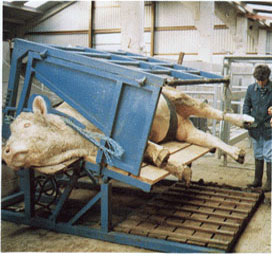JOHN ELLIOTT
PEDIGREE BULL HIRE
BULLS AT HOME
WHEN NOT AT WORK THE BULLS ARE INDIVIDUALLY HOUSED IN
ROOMY PENS, A BED AT ONE END AND PLENTY OF FOOD AND WATER AT THE OTHER.
ROUTINE CARE AND MAINTENANCE
Charolais bull ready for hoof trimming, a tip- over cattle crush allows this and other treatment to be done safely and without stress for the animal.

VACCINATION AND GENERAL HYGIENE
ALL VACCINATION COSTS ARE INCLUDED BUT SOME BOOSTERS MAY NEED TO BE ADMINISTERD WHILE THE BULL IS ON HIRE, (A COUPLE OF SMALL INJECTIONS). WE CAN VISIT TO DO THIS, OR SUPPLY THE VACCINATIONS FOR YOU TO DO IT.
From 2008 the bulls are being tested for johnes disease - any found positive will be culled
Tuberculosis and Brucellosis. Each bull undergoes a T.B. and a Brucellosis test on an annual
basis. The spread of T.B. in certain parts of the country makes this paramount
B.V.D. Each bull is tested to ensure he is not carrying the disease. Carrier bulls will be culled. Each bull which passes the test will be vaccinated against B.V.D. and re-vaccinated annually.
Digital Dermatitis. Each bull receives a routine preventative treatment against digital dermatitis both on his return to Westfield and prior to sending him out to a new farm. Each animal will be scrutinised and if any signs of digital dermatitis are observed then a course of treatment will be administered.
Leptospirosis. Each bull is treated to prevent the risk of the carrier status, and will also undergo a vaccination programme against Leptospirosis which will include annual re-vaccination.
Campylobacter. This is not a common disease, but we are aware that it is one which can be spread by the use of a bull. It can be associated with abortion, but can also be spread as a venereal disease as a cause of infertility. Any bull which is even suspected of carrying this disease will be investigated, treated, or both, on his return to Westfield. However, as an extension of our routine disease control, we can offer a preventative course of treatment which involves a course of three daily antibiotic sheath washes. (there is an additional charge for this course of treatment.) ANY bull tested upon return to be positive for Campylobacter is culled from the herd .
Parasites. Each bull, on his return to Westfield receives a routine treatment to control the usual skin parasites. Appropriate treatment will also be given to control the internal parasites when required.
